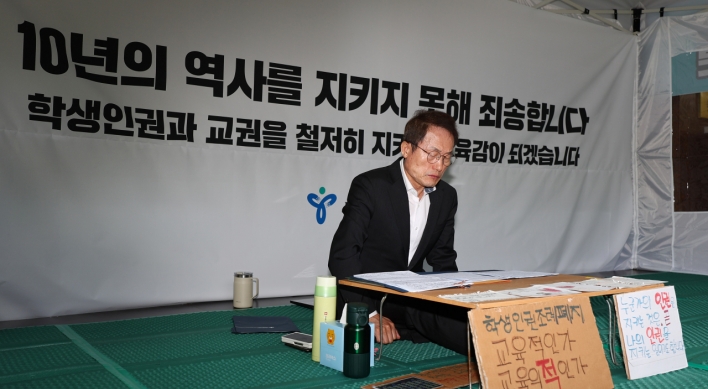Abe’s shrine visit freezes Asia ties, rattles U.S.
By Shin Hyon-heePublished : Dec. 27, 2013 - 20:51

Tension is escalating in Northeast Asia in the wake of Japanese Prime Minister Shinzo Abe’s trip to a controversial war shrine, putting the U.S.’ strategic refocus toward the economically vital region to the test.
Abe on Thursday became the country’s first leader to visit the Yasukuni Shrine in nearly eight years to mark the first anniversary of his second premiership. It instantly incited strong condemnation from Korea and China with which Japan’s relations are already snowed under in festering historical and territorial feuds.
The surprise trip also dealt a blow to the U.S., which has been striving to rein in the hawkish prime minister’s nationalist ambitions to promote trilateral strategic cooperation with Korea and a better bilateral relationship with a rising China.
The U.S. State Department on Friday expressed its “disappointment,” reiterating the statement issued by the U.S. Embassy in Tokyo a day earlier which warned that Abe’s move will “exacerbate tensions” with Japan’s neighbors.
The unusually tough wording and unprecedented form of the commentary contrasted with Washington’s response to past prime ministerial visits. When former premier Junichiro Koizumi repeatedly worshipped at the shrine from 2001-06, the State Department and other Washington officials refrained from commenting, casting it as a domestic affair.
With the U.S. “pivot” to Asia, however, Abe’s decision has placed Washington in an awkward position to press Seoul to try to overcome historical wounds and forge a future-oriented relationship with its former occupier.
“For many in Washington, Abe’s visit to Yasukuni and issues like comfort women have been the bottom line,” a Seoul official said on condition of anonymity due to the sensitivity of the matter. “They should have been stunned and perplexed as much as we were.”
Despite recent notable progress in the U.S.-Japan partnership, Washington has offered signals ― or veiled warnings ― against Abe’s visit to the shrine.
The pilgrimage came less than three weeks after U.S. Vice President Joe Biden called for improved ties between neighbors during a trip to Tokyo. The U.S. also gave a “chilly response” when Abe’s special advier Seiichi Eto floated his trip at meetings with Washington officials last month, Japan’s Yomiuri Shimbun reported Tuesday.
In October, U.S. Secretary of State John Kerry and Secretary of Defense Chuck Hagel paid homage at Chidori ga Fuchi, a Tokyo cemetery.
The move apparently targeted Abe, who months earlier equated Yasukuni to the Arlington National Cemetery just outside Washington, which is home to some 400,000 fallen U.S. troops from the Civil War to battles in Iraq and Afghanistan. Washington officials called Chidori ga Fuchi the “closest equivalent” to Arlington.
But Washington’s disappointment would unlikely result in a shift in its alliance with Tokyo, which has been pushing to reinterpret its pacifist constitution to run a full-fledged military. The drive serves U.S. interests held back by persistent economic woes and budget constraints.
During their October trip, Kerry and Hagel also reaffirmed U.S. support for the Japanese initiative for a “normal state,” despite Seoul and Beijing’s concerns over its military ambitions.
“As their strategic interests fit into each other, it’s difficult for us to expect the U.S. to apply greater restraints on Japan,” another Seoul official said on condition of anonymity due to the sensitivity of the issue.
“But Abe’s current behavior highlighted by his visit to the shrine is hardly favorable for the U.S. If such an event gets repeated, the U.S. may work more actively to keep its ally in check.”
By Shin Hyon-hee (heeshin@heraldcorp.com)




![[KH Explains] No more 'Michael' at Kakao Games](http://res.heraldm.com/phpwas/restmb_idxmake.php?idx=644&simg=/content/image/2024/04/28/20240428050183_0.jpg&u=20240428180321)












![[Herald Interview] Mistakes turn into blessings in street performance, director says](http://res.heraldm.com/phpwas/restmb_idxmake.php?idx=652&simg=/content/image/2024/04/28/20240428050150_0.jpg&u=20240428174656)
